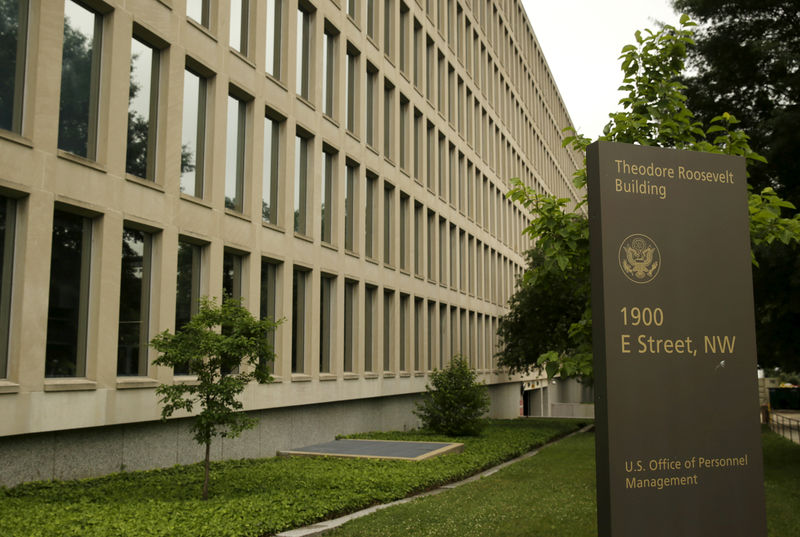By Mark Hosenball
WASHINGTON (Reuters) - At a time when the United States says China is aggressively spying on its government, a push by President Donald Trump to fix the system that determines who can and cannot be trusted with secrets is behind schedule and disorganized, according to U.S. officials and an internal agency report.
While the process for security clearance background checks has been broken for years, the Republican Trump administration delayed starting a revamp for months, said Senator Mark Warner, the top Democrat on the Senate Intelligence Committee.
With a June 24 deadline for the U.S. Office of Personnel Management (OPM) to begin transferring thousands of employees and contractors to the Department of Defense under Trump's plan, it is unclear when the overhaul will be completed, said four government sources who requested anonymity.
Most security clearances involve jobs at the White House, Defense, State, Homeland Security, Energy and Justice departments, the Central Intelligence Agency and the National Security Agency.
Backlogs in the process can delay appointments to sensitive positions or complicate the handling of various levels of America's secret information.
Over the years, OPM has accumulated a backlog of more than 400,000 uncompleted clearance investigations, with some taking more than a year to finish, congressional experts said. A September 2018 internal OPM report seen by Reuters said the Trump transfer is handicapped by the consequences of a cyber attack on OPM's data systems in 2014-2015 that compromised personally identifiable information of millions of people.
The U.S. suspected that China was involved in the hack, which Beijing said was criminal and not state-sponsored. Russia, whose agents U.S. agencies said meddled in the 2016 election with cyber attacks and disinformation, remains a determined U.S. intelligence adversary, security officials said. Moscow denies interfering in the election.
Neither the OPM nor the Defense Department responded to questions about the internal report.
In the past year, three former senior U.S. intelligence officials, who all held top-secret clearances at some point, have pleaded guilty or been convicted of spying for China https://www.reuters.com/article/us-usa-china-spy/former-cia-officer-jailed-for-20-years-for-spying-for-china-idUSKCN1SN2N0.
The Chinese government disputes U.S. allegations that it tries to recruit Americans with access to government and commercial secrets https://www.reuters.com/article/us-linkedin-china-espionage-exclusive/exclusive-u-s-accuses-china-of-super-aggressive-spy-campaign-on-linkedin-idUSKCN1LG15Y.
'LACK OF COMMUNICATION'
The transition of background investigations to the Defense Department was one piece of a larger reform of how the government does clearances and "it was unfortunately slowed because the president sat on an executive order enabling the transfer for some nine months," Warner said.
The internal OPM report found that "conflicting expectations and lack of communication" were hampering the handover.
Since the report's completion, the process has proceeded erratically, with confusion on issues such as funding and data management, officials familiar with the matter said.
A senior Trump administration official noted that the transfer of security background investigations from one government department to another was a major operation with challenges.
"However, this administration has already reduced the security clearance inventory by 40%, from 725,000 to 416,000, and we look forward to continuing the transfer as efficiently and effectively in the coming months," the official said.
Trump, who has targeted the OPM for permanent shutdown, began the handover in June 2018, but he did not formally announce it until an April 24, 2019 executive order.
OPM, under Trump's order, is supposed to begin the transfer of 3,300 agency employees and 6,000 OPM contractors to the Defense Department by June 24 and finish it by Oct. 1.
The work of OPM's National Background Investigations Bureau (NBIB) would move to the Pentagon's Defense Security Service (DSS), which will be renamed the Defense Counterintelligence and Security Agency (DCSA).
WEEDING OUT
Security clearance background checks are a routine requirement for people hoping to be hired by the federal government and contractors, as well as current employees looking to move up in the clearance hierarchy: confidential, secret and top secret.
For top-secret clearance candidates, investigators interview friends, co-workers and neighbors about the backgrounds, character and habits of job applicants. The process is meant to weed out people who cannot be trusted with classified or sensitive government information.
A U.S. House of Representatives committee is investigating whether some staffers in Trump's White House received high-level security clearances over the objections of career officials, including Trump's daughter Ivanka Trump and son-in-law Jared Kushner.
Efforts to transfer the 3,300 OPM employees to the Pentagon appear to be moving forward, but as of early June, the transfer of contractors to the Pentagon faced steep challenges, one of the sources involved said.
"It's chaotic. People are trying to make it happen. But it's change on change on change and this is the kind of thing that people run away from," said the source.
Asked about criticisms of the handover, an OPM spokesman said: "Since the administration proposed the transition in June 2018, NBIB has been working closely with its DSS counterparts to conduct a seamless transition by October 1, 2019."
Under Trump's plan, the Pentagon also wants to end periodic check-ups of clearance holders and adopt a system in which the new DCSA would use artificial intelligence (AI) to periodically vet the names and credentials of clearance holders online.
Defense Department officials worry an AI-based system cannot work as well as in-person investigations, said one source involved in the transition.
It may be months, or even years, before the Pentagon has a data system capable of handling all the relevant security clearance information, said the same source.

"Large scale government IT efforts do not have great track records," Senator Warner said. "I look forward to working with the executive branch and our industry partners on modernizing the clearance system. But it will not be easy or fast."